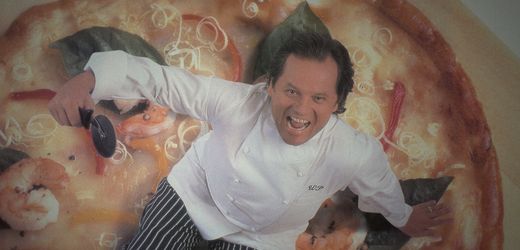
One began his rise in the US as a muscle man, the other in the kitchen of a bad French restaurant. Both worked their way up and today embody the American dream: Arnold Schwarzenegger and Wolfgang Puck are the most famous Austrians in the United States.
One made it to the movie star and governor, the other to the favorite palate-pleaser of the movie stars. No Oscars ceremony without the creations of Wolfgang Puck. in 2020, for example, there were stuffed rice paper rolls with cucumber and cheese macaroni.
Hollywood residents have loved him for decades, and Barbra Streisand, Tom Hanks, Sean Connery and Lionel Richie ate at his restaurant Spago on the Sunset Strip in Los Angeles back in the 1980s. Today, Puck operates more than 70 establishments all over the world – most of which serve Wiener Schnitzel – employs 5,000 people and sells tens of millions of dollars a year.
You’d think Wolfgang Puck had a lot to tell. In “Wolfgang”, however, he achieves the feat of talking for more than 70 minutes and barely saying anything. Except sayings from the handbook of the successful New American.
“We all make mistakes in life.«
“Believe in yourself, and you will succeed.«
“Follow your dreams.«
That’s not necessarily Puck’s fault. At least it would have been the director’s job to dig deeper, to expose facets that Puck is not so fond of showing. But David Gelb, who is also responsible for the cooking series “Chef’s Table” at Netflix, pastes his film with the visual equivalent of a particularly sticky béchamel sauce. The pictures look like licked, but taste they have none.
Puck’s story is fascinating. Raised in Carinthia as an unloved, illegitimate child, terrorized by the stepfather: Puck always wanted to get away from home. He felt comfortable alone in the kitchen. At the age of 14, he starts as a kitchen boy in a hotel, peels potatoes, rinses, lets himself be shouted at by the chefs.
But Puck prevails. He first goes to France and studies under Raymond Thuilier before emigrating to California in the seventies without the proverbial penny in his pocket. There’s Puck 24 years old. In Los Angeles, he cooks at the French restaurant Ma Maison, a popular but shabby shop with plastic chairs and garish interiors.
Puck procures fresh vegetables from local farmers, insists on the best quality of ingredients, and with quiet persistence he makes the Ma Maison a success. More than that: Puck opposes ready meals, artificial flavors, industrial mass production of learned crafts and the appreciation of nutrition as a cultural good.
This is also why his career took off in the eighties. With his California Cuisine, a fusion cuisine of Italian, French and Asian ingredients, he toured the television channels. At the Spago, the Hollywood crowd could watch him cook. Joan Collins he served a legendary smoked salmon pizza with caviar. Reduction and luxury were not a contradiction at Puck, but a secret formula. The cook stepped out from behind the stove and became a star himself.
Although Gelb traces the individual stages of this career, he does not make history out of it. His portrait “Wolfgang” remains vague and vague. This corresponds to the enervating uniformity that already distinguishes the eight seasons of “Chef’s Table” and offshoots such as the series “Streetfood”.
A chef must constantly change, says Puck at one point in” Wolfgang”, and Gelb’s cooking series also always tell of transformation: of the protagonists ‘ struggle against adverse circumstances, traumas, catastrophes. Ultimately, finding an artistic voice.
But the films themselves are surprisingly inflexible. They follow a fixed visual and dramaturgical pattern that is never varied. In yellow, the culinary artists look like rock stars or characters from a Hollywood drama, but the eternal repetition creates an increasingly inedible uniform porridge over time.
“Wolfgang” seems like a particularly long and uninspired episode of”Chef’s Table”. It is there that the viewer gets acquainted with at least interesting characters and cooking styles. Puck, on the other hand, seems staid and closed, more like an entrepreneur than someone who expresses his innermost being at the stove.
The most important, critical questions remain unanswered: How does constant expansion cope with supposedly high quality standards? Why does it have to be more and more? Why does Puck sell the ready meals he once competed against? And what is he actually – Wiener Schnitzel King or a culinary artist?
Instead, there are more platitudes from the self-optimization seminar:
“I want to make people happy.«
“Food is family. Family is food.«
Perhaps, this thought imposes itself, Puck is more of a gifted self-actor than a truly inspiring chef.
From 25.6. at Disney+


